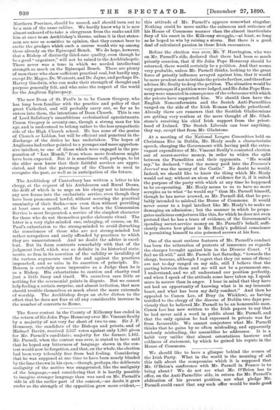The Archbishop of Canterbury has written a letter to his
clergy, at the request of his Archdeacon and Rural Deans, the drift of which is to -urge on his clergy not to introduce any new forms into the eucharistic service, even though they have been pronounced lawful, without securing the practical unanimity of their flocks,—nor even then without providing at least once a month, at the hour when the Communion Service is most frequented, a service of the simplest character for those who do not themselves prefer elaborate ritual. The letter is a very right-minded one, enlarging, of course, on St. Paul's exhortation to the strong-minded to avoid disturbing the consciences of those who are not strong-minded but rather scrupulous and easily offended by practices to which they are unaccustomed. And no doubt the advice is excel- lent. But its form contrasts remarkably with that of the judgment itself, which was so definite in its historical state- ments, so firm in its assertion of the validity or invalidity of the various arguments used for and against the practices impeached, and so calm in its assertion of principle. Dr. Benson is certainly more impressive as a Judge than he is as a Bishop. His exhortations to caution and charity read just a little fussy and timid. We ourselves care little or nothing for the ceremonial points in dispute. But we cannot help feeling a certain surprise, and almost irritation, that men should trouble themselves so much about the mere externals of worship. The Archbishop drops an obiter dictum to the effect that he does not fear at all any considerable increase in the number of converts to Rome.


































 Previous page
Previous page